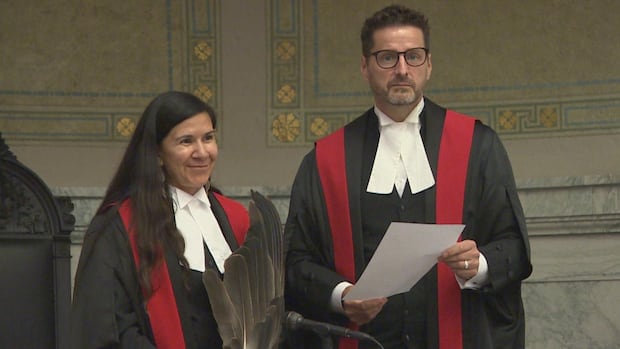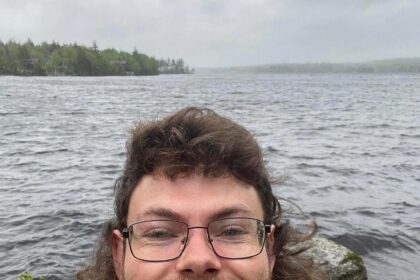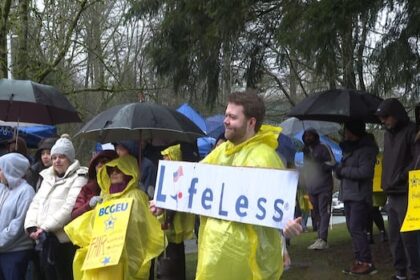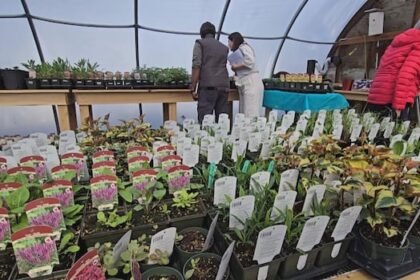ManitobaManitoba’s newest provincial court judge took a different approach in her swearing-in ceremony, with her Anishinaabe culture and language on full display.Manitoba provincial court Judge Jerilee Ryle ‘born to become a judge,’ chief justice saysOzten Shebahkeget · CBC News · Posted: Oct 03, 2025 5:46 PM EDT | Last Updated: October 3Manitoba provincial court Judge Jerilee Ryle, left, is seen taking her oath during her public swearing-in ceremony on Friday, alongside Chief Justice Ryan Rolston. (CBC)Manitoba’s newest provincial court judge took a different approach in her swearing-in ceremony, with her Anishinaabe culture and language on full display.Judge Jerilee Ryle, a member of Lake St. Martin First Nation who was called to the bar in 2006, was sworn in publicly on Friday.The ceremony at Winnipeg’s law courts opened with a traditional drum song that gave thanks for the Anishinaabe people’s strength, and a pipe ceremony was held earlier in the day.Ryle, who took her oath on an eagle feather, introduced herself to the court in Anishinaabemowin — the language she says should have been her first, but colonization “has shaped parts of my family’s story.” Her mother and aunt are residential school and day school survivors, she said.The courtroom was filled with dignitaries, family members and other members of the legal community as Ryle was presented with an eagle wing as a symbol of kindness, love and compassion, as well as a reminder that she’s never alone.”I am deeply aware that I walk in the footsteps of those who paved the way,” Ryle said, acknowledging Murray Sinclair, the first Indigenous judge in Manitoba, and Doreen Redhead, the first Indigenous woman to become a judge in Manitoba.”While we’ve made significant strides, the journey toward equity and justice continues. I hope that in some small way, my contribution helps light the path forward for the ones who come next.”Ryle previously worked as a Crown prosecutor in Thompson, The Pas and Winnipeg. She also founded the Manitoba Prosecution Service’s Indigenous advisory council, and was working as its reconciliation lead before she was appointed as a judge earlier this year.Ryle reflected on the evolution of Canadian law and how it has changed to reflect societal values. For example, the Indian Act banned Indigenous people from traditional ceremonies for 67 years, from 1884-1951, she said.For too long, the only place Indigenous people appeared in Canada’s courts was the prisoner’s box, she said.But things have changed, and Ryle says key reports and inquiries — such as the Truth and Reconciliation Commission’s 94 Calls to Action, the National Inquiry into Missing and Murdered Indigenous Women and Girls and the Aboriginal Justice Inquiry — have helped lead Canadian courts on a new path.’Force for change’Court of King’s Bench Chief Justice Glenn Joyal said Ryle has been a leader in advancing reconciliation in Manitoba’s court system.She brings “the type of dedication, ability and experience necessary to fulfil the task she faces,” he said, and her lived experience as an Anishinaabe woman and lawyer “will be uniquely valuable and important” to the provincial court.Manitoba provincial court Chief Justice Ryan Rolston said the day was a long time coming.He praised Ryle’s lived experience, her extensive legal career, and her mentorship of young lawyers, saying her appointment as a judge has brought “distinct excitement that reverberates through the chambers.””For me, it was almost as if Jerilee Ryle was born to become a judge of our court.”Stacey Soldier, the first Anishinaabe woman to lead the Manitoba Bar Association, said she was a budding lawyer when she first heard of Ryle, describing her as a “lawyer who looked like me, who came from a community like mine.”Soldier said she’s met many other young Indigenous women studying law who also admire Ryle, calling her a “force for change” throughout her legal career.”You’ve shown them how to open that door,” Soldier said.CorrectionsAn earlier version of this story misquoted Judge Jerilee Ryle as saying she hopes her “contributions pave the way for the ones who come next.” In fact, she said she hopes her “contribution helps light the path forward for the ones who come next.”Oct 03, 2025 7:49 PM EDTABOUT THE AUTHORÖzten Shebahkeget is a member of Northwest Angle 33 First Nation who grew up in Winnipeg’s North End. She has been writing for CBC Manitoba since 2022. She holds an undergraduate degree in English literature and a master’s in writing.Email: ozten.shebahkeget@cbc.ca
Wednesday, 8 Oct 2025
Canada – The Illusion
Search
Have an existing account?
Sign In
© 2022 Foxiz News Network. Ruby Design Company. All Rights Reserved.
You May also Like
- More News:
- history
- Standing Bear Network
- John Gonzalez
- ᐊᓂᓈᐯᐃᐧᐣ aninâpêwin — Truth
- Creation
- Beneath the Water
- Olympic gold medal
- Jim Thorpe
- type O blood
- the bringer of life
- Raven
- Wás’agi
- NoiseCat
- 'Sugarcane'
- ᐅᑳᐤ okâw — We remember
- ᑲᓂᐸᐏᐟ ᒪᐢᑿ
- This is what it means to be human.
- Nokoma
- Kanipawit Maskwa
- Native American names











